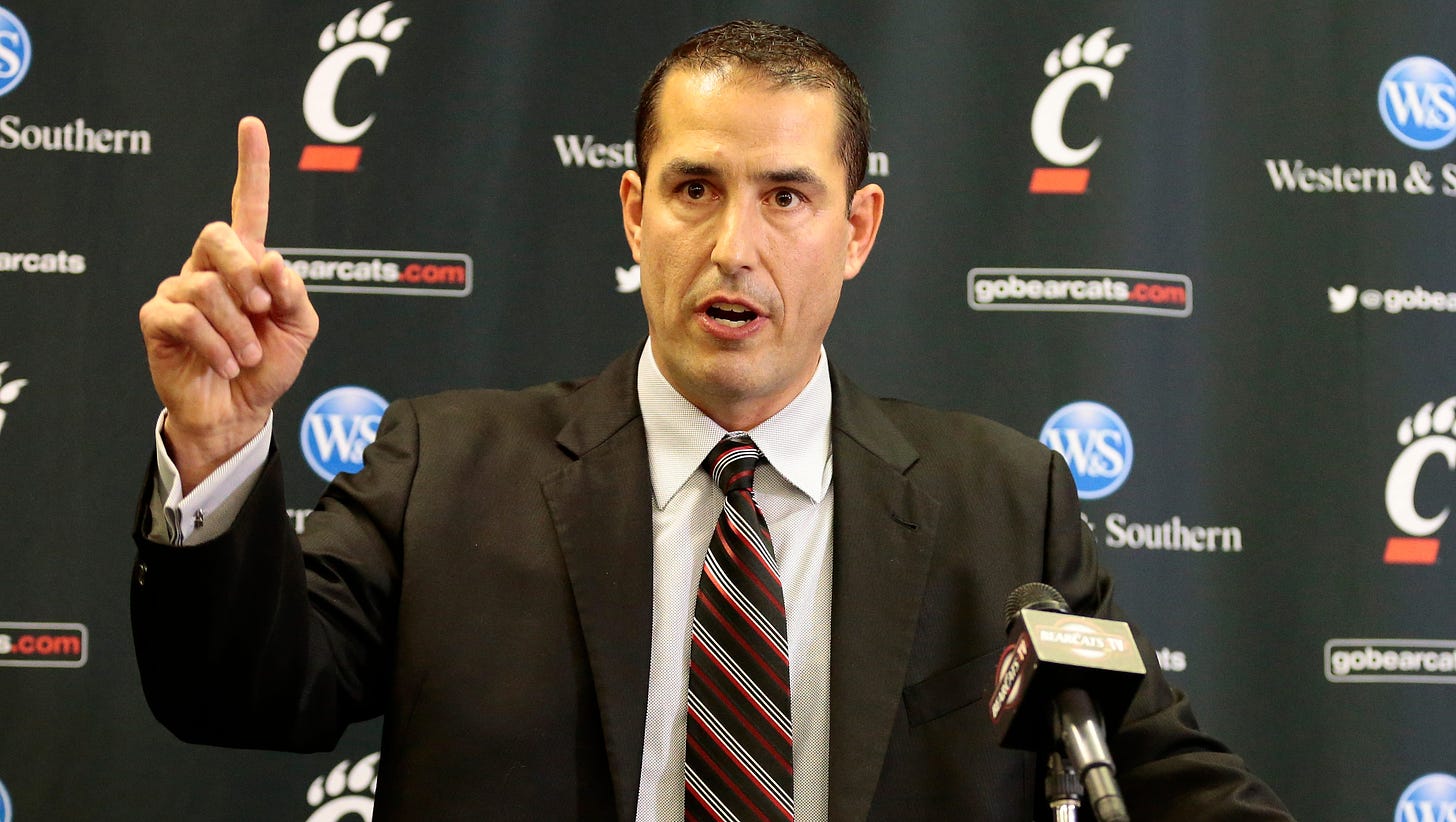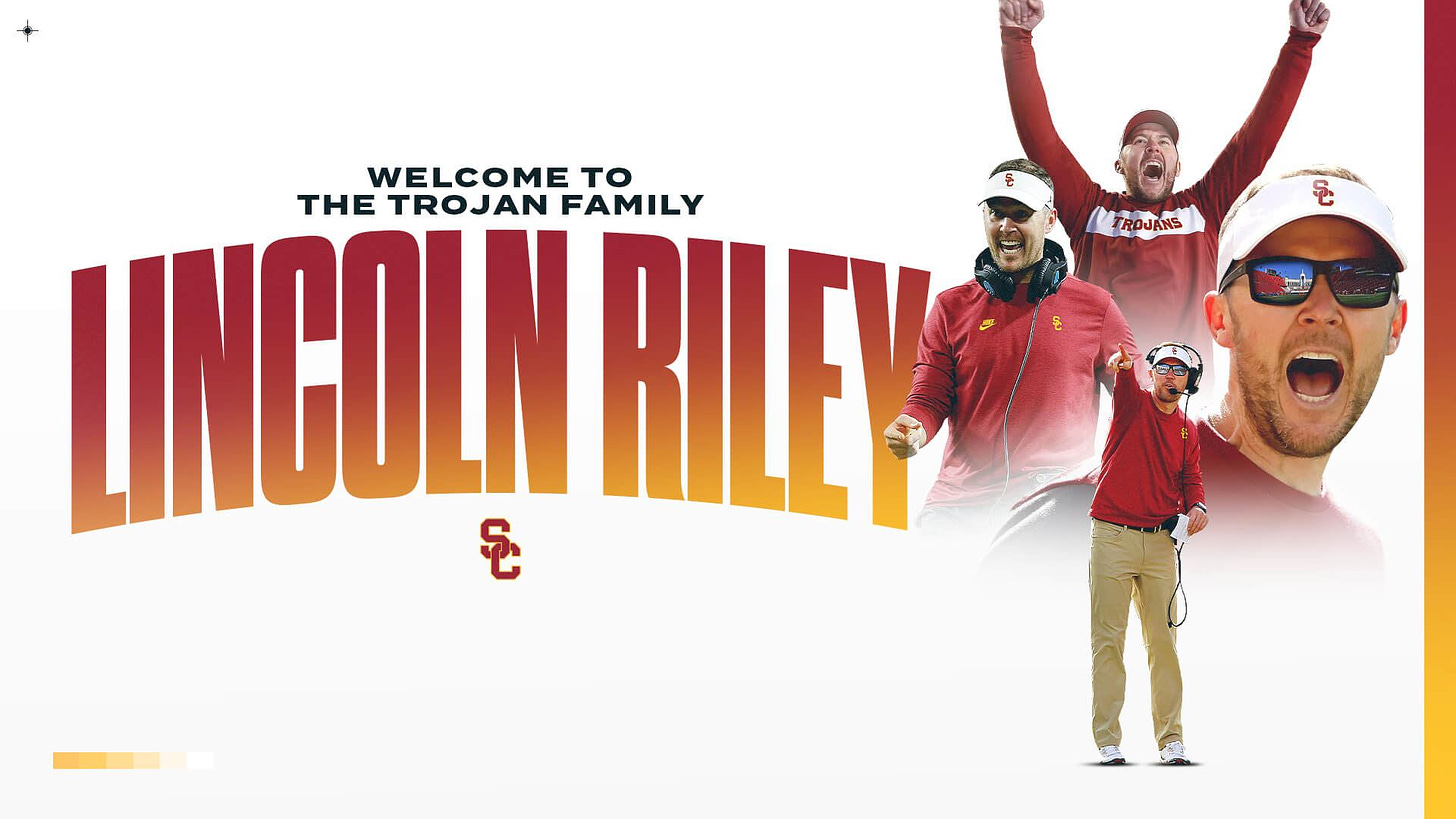College football is a sport built on confidence.
I mean that both in the most straightforward sense, and in the sense that the sport’s operations are largely a grift, but today I’m going to focus more on the former.
Football programs rise or fall on confidence: the confidence of recruits that a program will provide them opportunities to play, opportunities to win, and opportunities to develop their skills and move on to professional play; the confidence of coaching staffs to those get players—largely 18-to-23-year-olds—to buy into their training regimens, playbooks and team culture; the confidence of university administrators and boosters to keep backing those coaches in their efforts; the confidence of fans to keep voting in support of a program with their eyeballs, dollars and butts in seats.
We all know that confidence matters, and that’s often why a public vote of confidence in a flailing coaching staff is often rightly seen as the kiss of death for their tenure; if you have to say that you have confidence, it’s obvious to all that you don’t.
Confidence matters on the field; the emotions, decision-making and quality of play among young amateur players is far more variable than that of their professional counterparts, and a coach or crowd or alternate uniform instilling irrational confidence in a group of players can legitimately swing the result of a game, a season, a coach’s career, a program’s future.
The 2021 college football regular season ended yesterday, save for a handful of delayed games and the annual Army-Navy contest, and that means we’re entering Confidence Season. The coaching carousel begins spinning in earnest the moment play ends on that last Saturday in November, and there’s often a compulsion among fans, sportswriters and commentators to assess each new hire with absolute confidence, to assign a letter grade and state with near-certainty the exact vector a program will be on for the next 4-5 years.
I urge you to avoid this compulsion, and instead of harping on assessments made by others with the benefit of hindsight, I’m going to offer up myself in sacrifice.
I want to discuss what I thought about a few coaching moves from the past five years.
Tom Herman, Texas Longhorns
This one felt like an absolute home-run hire. Herman was a key component of Urban Meyer’s 2014 staff at Ohio State, serving as offensive coordinator and quarterbacks coach for a team that won the inaugural College Football Playoff largely on the strength of an explosive offensive and a trio of quarterbacks. In his first season as a head coach at Houston, Herman went 13-1, leading the Cougars to a Peach Bowl victory over Florida State. He had strong Texas ties, a championship pedigree, and confidence and personality to spare. Many people felt that his hire in Austin meant that Texas Was Back, and I was one of them. He’d have the Longhorns back competing for titles in short stead.
Well? He didn’t. Herman’s tenure at Texas wasn’t a disaster—a 32-18 record over four seasons in burnt orange—but a 22-13 record in Big 12 play damned him, and he was let go. Not what I expected.
Scott Frost, Nebraska Cornhuskers
The situation in Lincoln wasn’t much different from the one in Austin—a proud, decorated program in dire need of a revival—and I was confident that Scott Frost would be the one to lead it. He checked every box.
A popular former player from the team’s absolute apex, a two-time national champion as the Huskers’ quarterback in the mid-’90s. He took over a program at Central Florida that had cratered to an 0-12 record in 2015 and led them to a 13-0 mark in 2017 that should’ve given the Knights a shot at a national title. There was absolutely no reason to doubt this hire; Frost was exactly what Nebraska needed.
Perhaps he’ll still turn it around, but four seasons in? It hasn’t happened yet. Frost hasn’t posted a winning record at Nebraska yet, and though the Huskers were unlucky in one-score games in 2021, their record of 3-9 (1-8 Big Ten) doesn’t suggest improvement is imminent.
Again, not what I expected.
Dan Mullen, Florida Gators
Florida has struggled with coaching hires since Urban Meyer first stepped aside in 2009. Will Muschamp played big dumb football; Jim McElwain just played dumb football. Dan Mullen, though? He could bring the Gators back. He won two titles as Meyer’s offensive coordinator in Gainesville, and seven winning seasons in nine years at the helm of Mississippi State—a hard place for anyone to win consistently—suggested, at least to me, that he’d do even better with the kind of recruits he could get in The Swamp.
Obviously, that’s not the case—Mullen was let go earlier this month after four seasons of diminishing results that ended with a 2-9 record in his last 11 games against Power 5 opponents.
I thought each of these coaches were exactly what their program needed, and I was very, very wrong.
But let’s not just talk about would-be successes that failed; how about a time where I was quite happy to be wrong?
Luke Fickell, Cincinnati Bearcats
The head coach at my alma mater might be the hottest commodity on the coaching market, were he actually on the market. He took over a program that had gone 4-8 in its last season under future senator Tommy Tuberville, and there weren’t a ton of reasons for fans like myself to be optimistic. The Bearcats were mired in Group of Five mediocrity and sliding into irrelevance after a mostly-successful prior decade. Fickell seemed a steady, if largely uninspiring hire; a longtime Ohio State assistant with one 6-7 season as head coach to his name as the Buckeyes’ interim caretaker between title-winning program legends Jim Tressel and Urban Meyer.
In his first season in Cincinnati, Fickell matched the previous year’s 4-8 record, but then he was off to the races. In the last four seasons, the Bearcats have gone 43-6, earned an invite to the Big 12, and are currently undefeated and in contention for both a second straight American Athletic Conference title and an unprecedented spot in the College Football Playoff as a Group of Five team. Fickell is the best coach in the program’s 136-year history, and that’s hardly even a subjective statement.
Let’s see what I had to say about his hire at the time!
(Dennis is an Ohio State fan and a resolute hater, for clarity.)
The primary lesson of today is that I don’t know anything—something that longtime readers of this newsletter surely already know—but none of my opinions were out of the mainstream at the time. Earlier this season, Chris Vannini of The Athletic took a fun look at how many media outlets graded these hires (and others) and how those grades look with the benefit of hindsight.
Even as we’re early in this cycle, I can stake a fresh round of opinions—USC poaching Lincoln Riley from Oklahoma feels like a major coup for the Trojans, and Florida hiring Billy Napier feels solid but unlikely to put the Gators back in competition with the Georgias, Alabamas and Cincinnatis of the world—with full confidence and full knowledge that I’ll probably be wildly wrong. The Gators probably will win a title in two years just to prove how little I know. It doesn’t matter, really.
It is natural to want to distill success stories to handy, easily-digestible narratives and instant-reaction letter grades. No one works in a vacuum, though; countless factors go into making a winner, and that’s true whether we’re talking about football, business, the arts, family life or any other field where we assess people as successes or failures.
In football, a coaches’ success doesn’t just depend on some inherent, immovable factor of Is A Winner or Isn’t A Winner. Cultural fit, administrative support, recruiting knowledge, competition, and simply luck factor greatly into determining whether someone succeeds or not, and it’s virtually impossible for an outside observer—or one on the inside, either—to know all of those with certainty.
Do they rely on talent advantages, or on coaching up lesser-rated recruits? Do they rely on a specific system, and will that translate to a new role? Can they handle media, boosters, fans? Are they maniacally focused in a way that will allow them to succeed, or fanatically driven in a virtually-indistinguishable way that will spell their downfall?
Let this be a solace if your program makes a seemingly ho-hum hire and caution should they have an apparent stone-cold lock on their hands.
You cannot know what is going to work. But you have to have confidence.
—Scott Hines (@actioncookbook)






The whole dynamic of "Nerdy Ivory Tower School President" hires a "Athletic Director Whose Main Skill is Fundraising" who hires a "Football Coach So Focused on Football That He Doesn't Know What an Asparagus Is" is just so funny to me
"Who the bleep is Kirk Ferentz??!?" -- me, December 1998